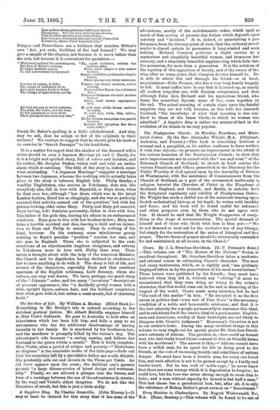Cicero. By J. L. Straehan-Davidson. (G. P. Putnam's Sons.) —This
volume, one of "The Heroes of the Nations" Series, is excellent throughout. Mr. Strachan-Davidson takes a moderate and rational course in estimating Cicero's character. The man had many weaknesses, which, as is rightly said, "are pitilessly displayed before us by the preservation of his most secret letters." These lettere were published by his friends; they must have believed when they did it, without any " editing " it must be remembered, that they were doing no wrong to the writer's character, that this would come out in the end as deserving of the respect of the world. Cicero made many mistakes, but he had "the root of the matter" in him. "He accepted it as the first axiom in politics that some sort of Free State' is the necessary condition of a noble and honourable existence ; and that it is the last calamity for a people permanently to renounce this ideal, and to substitute for it the slave's ideal of a good master. English- men and Americans, worthy of their birthright, are not likely to disagree with Cicero's judgment." Mommsen's Ctesarism is not to our author's taste. Among the many excellent things in this volume we may single out for special praise Mr. Strachan-David- son's estimate of Atticua. The problem is,—how could an honest man who had really loved Cicero consent to live on friendly terms with his murderers ? The answer is this,—"Atticus cannot have been a selfish man, for he spent his life in doing good to his friends, at the cost of unceasing trouble and sometimes of serious danger. He must have been a lovable man, for every one loved him, and such affection is not to be gained except by a kindly and tender heart. But he was void of noble rage ;' he never knew that there are some wrongs which it is degradation to forgive ; ' he could love, but his love was never strong enough to cause him to hate ; and a man without capacity for hatred is but half a man." This last clause has a paradoxical look, but, after all, it is only the substance of Bishop Butler's great sermon on " Resentment."


































 Previous page
Previous page